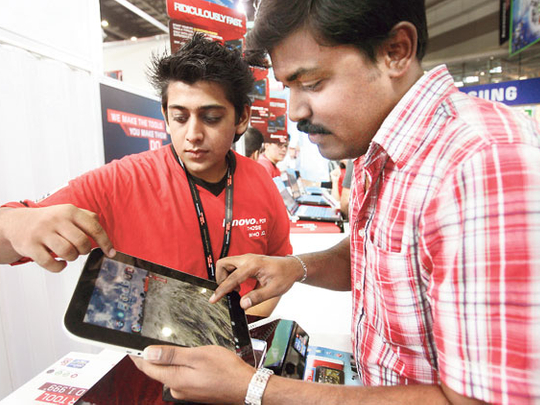
Dubai: Both consumers and businesses are not doing enough to secure their smartphones and tablets against hacking attacks, industry experts say.
"The threat landscape is predicted to become extremely volatile as more people rely on smartphones and tablets. The wider the consumers use them the more attractive these devices become as targets for hackers as a means of fin-ancial gain and other nefarious activity," said Gary Clark, Vice-President for SafeNet, EMEA.
"If your phone is lost or stolen, all your personal data, including passwords, banking details, e-mails and photos could be used to steal your identity," he said.
He said smartphones are like mobile computers, so you need to protect and secure your phone just as you would secure your home or mobile computer.
Users have a tendency to treat smartphones and tablets as low risk, without understanding the security implications of using these devices to access corporate data and networks, he added.
Large enterprises are struggling to manage a growing mobile workforce, using multiple devices and operating systems and increased data consumption. Mobility multiplies the scope for attacks by hackers and renders corporate data more vulnerable.
Google recently admitted that more than 90 per cent of users of the Android operating system are running older versions that contain serious kernel vulnerabilities.
"Mobile security uptake is expected to increase over the next couple of years, as enterprises conform more strictly to data protection and compliance practices, and consumers begin to understand the impending security threat to their data," Nushin Hernandez, research analyst at Canalys, said.
She said investment in global mobile security solutions is expected to rise 44.2 per cent annually to $3 billion in 2015 from $760 million this year. By 2015, more than 20 per cent of smartphones and tablets will have security software installed from 4 per cent last year.
Preferred system
Developing countries in Latin America, Asia, Africa and the Middle East will experience a sharp rise in mobile security investment from 2013 to 2015, as Android continues to gain headway as the preferred operating system in more price-sensitive markets.
Hernandez expects a strong parallel to emerge between Android operating system growth and the volume of mobile malware threats, as the potential for more people to download compromised applications rises.
"Enterprises must adopt a holistic view, as there is no single solution that provides complete protection. A more robust approach, even compared to that used to protect typical notebooks and desktops, is needed," Clark said.
Canalys anticipates attack sophistication levels to rise with time. Providing service providers with a high-level of security from a network perspective, regardless of device or operating system type, will be a key differentiator from a security vendor perspective.
"We're encouraging enterprises to build a framework for mobile security that encompasses people, policies, processes and technologies as mobile operators are experiencing increasing malware attacks and are spending more time and money on recovery," she said.












